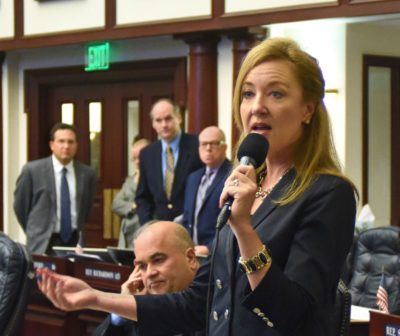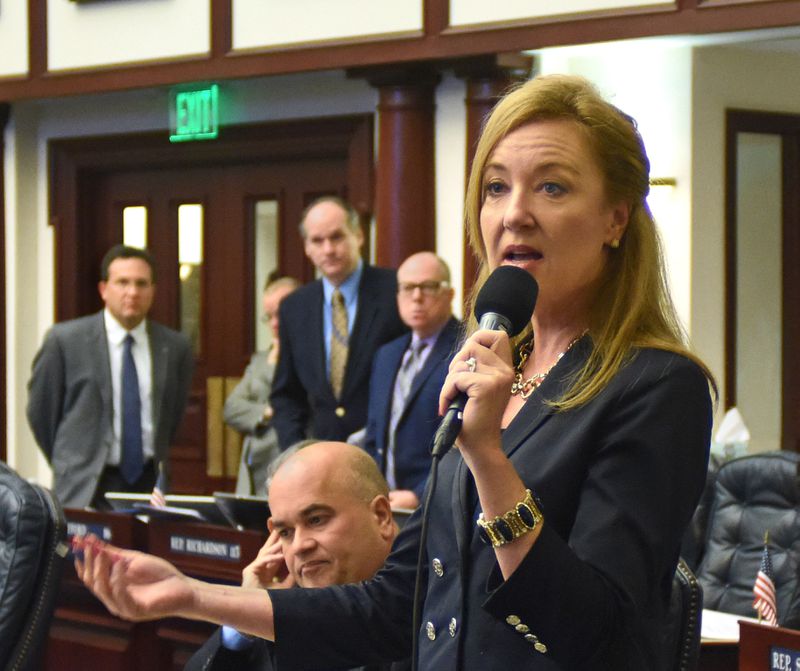


SB 680 is not only good for the future of sharks, it’s good for divers, fishers, the environment and our economy. It’s precisely why this environmentalist stands solidly in support and why I urge Gov. Ron DeSantis to sign it into law, state Rep. Kristin Jacobs writes in an op-ed


Letting the perfect be the enemy of the good is rarely a smart move.
Today, it would be hard to find anyone who doesn’t think the Clean Water Act ranks among the most transformative pieces of environmental legislation in our nation’s history. But back in 1972, when this historic bill was being put to a vote, there were plenty of naysayers who urged a veto because they said the Act did not go far enough. Back then, the pollution in our nation’s waters was so extreme that our rivers were literally on fire. But still “environmentalists” argued against passage because they didn’t get everything they wanted.
Thankfully, cooler heads prevailed and the course of environmental protection in the U.S. took a dramatic turn for the better.
Unfortunately, long-term institutional change does not happen in one fell swoop. It happens incrementally, building layer upon layer over time as all sides involved are heard, respected and ultimately become comfortable with going further.
Which brings us to SB 680, banning shark fin imports in Florida, among other notable gains.


State Rep. Kristin Jacobs, a Democrat, represents the 96th House District of Florida, which includes Coconut Creek, Margate, Coral Springs and Parkland in Broward County. COLIN HACKLEY PHOTO(COLIN HACKLEY/COLIN HACKLEY)
Amazingly, this bipartisan bill passed the combined membership of the Florida Senate and House with only a single dissenting vote. Why? Because it’s a good bill.
SB 680 is not only good for the future of sharks, it’s good for divers, fishers, the environment and our economy. It’s precisely why this environmentalist stands solidly in support and why I urge Gov. Ron DeSantis to sign it into law.
Hard to believe, but current law in Florida inadvertently welcomes the Black Market of shark finning. In essence, we do this by allowing unfettered import/exports which in turn provides a legal channel for illegal contraband to mask itself and enter the legal transshipment market.
It is the reason why the Port of Miami has gained the dubious distinction of having become the nation’s largest importer/exporter of shark fins. SB 680 shuts this channel down immediately upon being signed into law. No sunset dates, no waiting.
So why are some urging a veto? Because they believe it’s not perfect. Because they want more and they want it all in one fell swoop. And if they can’t get everything they want, they would rather see the bill die.
Isn’t that precisely what we are so sick of in this country? “My way or the highway” viewports that create a hostile environment where nothing gets done, nothing changes.
Once enacted, the shark fin bill will ban the import of shark fins both international and domestic. Period. Clear and simple. Additionally, the bill allows law enforcement landslide authority which they currently do not have.
With the bill’s passage, only those already holding the necessary permits will be allowed to export fins, closing the door on the current situation which allows anybody to sell fins. And last, the bill requires the Florida Fish and Wildlife Conservation Commission to do a study on the effect of the bill allowing the repeal of certain exemptions should the study prove it necessary.
These are significant steps forward. These are steps worthy of celebration.
Letters heralding this landmark legislation and the positive emotions on the floor of the House during final passage, have been pouring in from all over America. People are watching, and they are well pleased. I am proud to say that the Florida Legislature did something good. Very good.
And very good should never be our enemy.
State Rep. Kristin Jacobs, a Democrat, represents state District 96. She was appointed twice by President Barack Obama to serve as Chair of the National Oceans Council Governance Coordinating Commission and as a member of the State, Local and Tribal Leaders Task Force on Climate Change.
Stay in touch and get the latest WildAid updates.
SIGN UPAbout WildAid
WildAid is a non-profit organization with a mission to protect wildlife from illegal trade and other imminent threats. While most wildlife conservation groups focus on protecting animals from poaching, WildAid primarily works to reduce global consumption of wildlife products such as elephant ivory, rhino horn and shark fin soup. With an unrivaled portfolio of celebrity ambassadors and a global network of media partners, WildAid leverages more than $308 million in annual pro-bono media support with a simple message: When the Buying Stops, the Killing Can Too.
Journalists on deadline may email communications@wildaid.org